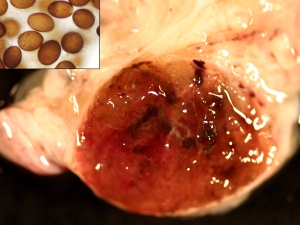Grant: 06-017R
Project Title: Blood Flukes, Major Pathogens of Sea Turtles: Molecular Detection and Identification
Project Manager: Dr. Ellis Greiner
Organization: University of Florida - College of Veterinary Medicine (Research and Educational Institute)
Grant Amount: $24,628.28
Completion Date: 2007-12-12
Summary: Spirorchiid trematodes or blood flukes are major pathogens of sea turtles and are associated with stranding and mortality worldwide. The diversity of spirorchiids documented in Florida sea turtles surpasses that of any other region. However, important aspects of disease, such as epidemiology and health impact on sea turtles, are impossible to study because information on the life cycles and pathogenicity of individual parasite species is very limited and there are inadequate research tools for spirorchiid detection and identification. We will sequence genus and species-specific areas of the parasite genome and use this information to develop new molecular diagnostic techniques to study spirorchiids in sea turtles and intermediate hosts. These methods will be applied to data and materials collected during sea turtle necropsies to prioritize spirorchiid species in terms of severity of disease. In addition, a PCR-based method will be developed for identifying intermediate hosts using a surrogate snail model, thus creating a valuable tool for field study of spirorchiid life cycles. Also, we will initiate testing of potential intermediate hosts at two study sites where turtles become infected. Using new molecular techniques, this project will provide important tools and information that are critical to understanding and potentially managing this important infectious disease. Results: This study has provided valuable information and research tools needed to better understand one of the most important pathogens of sea turtles. The applied methods and genetic data have the potential for broad applicability in parasite identification, specific detection, clinical diagnosis, and disease studies. Furthermore, the apparent cryptic diversity in the genus Neospirorchis and the tissue tropism of these parasites must be considered in more targeted studies of issues relevant to sea turtle health, such as the clinical, behavioral, and physiological effects of these parasites. Lastly, the life cycle component of this study was, to our knowledge, the largest effort to discover a marine spirorchid intermediate host. This missing component of the parasite life cycle has remained a barrier to important epidemiological and disease studies. Application of the molecular screening technique developed under this project led to the first break-through in the discovery of a marine spirorchid intermediate host. We have demonstrated that the issue of spirorchidiasis in Florida sea turtles is much more complex than previously recognized. The findings of this study hopefully will facilitate better understanding of the health implications of these parasites on Florida sea turtles and will serve as the basis for similar studies in sea turtles in other regions. (Author: Dr. Ellis Greiner)
Results: This study has provided valuable information and research tools needed to better understand one of the most important pathogens of sea turtles. The applied methods and genetic data have the potential for broad applicability in parasite identification, specific detection, clinical diagnosis, and disease studies. Furthermore, the apparent cryptic diversity in the genus Neospirorchis and the tissue tropism of these parasites must be considered in more targeted studies of issues relevant to sea turtle health, such as the clinical, behavioral, and physiological effects of these parasites. Lastly, the life cycle component of this study was, to our knowledge, the largest effort to discover a marine spirorchid intermediate host. This missing component of the parasite life cycle has remained a barrier to important epidemiological and disease studies. Application of the molecular screening technique developed under this project led to the first break-through in the discovery of a marine spirorchid intermediate host. We have demonstrated that the issue of spirorchidiasis in Florida sea turtles is much more complex than previously recognized. The findings of this study hopefully will facilitate better understanding of the health implications of these parasites on Florida sea turtles and will serve as the basis for similar studies in sea turtles in other regions. (Author: Dr. Ellis Greiner)